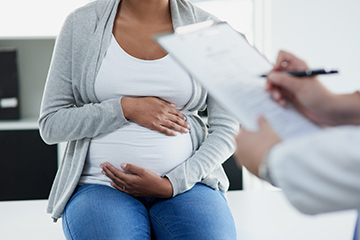How substance abuse affects your unborn baby
If you're pregnant or planning to have a baby, then it's important to start making healthier lifestyle choices to give your child the best possible start in life.
This means visiting your doctor for regular check-ups, following a balanced and healthy diet and most importantly avoiding alcohol, drugs and tobacco products. 
Avoiding substance use during pregnancy
Drug and substance abuse like alcohol causes serious health problems for the unborn baby and can affect your unborn baby even after birth. Babies who've been exposed to drugs and alcohol while in the womb are prone to suffer long-term physical and psychological damage.
Effects of drug use during pregnancy
In a recent Safe Passage Study by the Department of Obstetrics and Gynaecology, Faculty of Medicine and Health Science at Stellenbosch University, nearly 6 000 pregnant moms from Bishop Lavis and surrounding areas’ pregnancy journeys were followed and documented.
The moms reported using the following substances during their pregnancy:
- Alcohol (39%)
- Tobacco smoking (56%)
- Marijuana (11%)
- Methamphetamine (6%)
- Hookah pipe (21%)
Professor Hein Odendal at Stellenbosch University says one of the main causes of stillbirth in the Western Cape is placental abruption - the partial or complete detachment of the placenta before birth. "Placenta abruption occurred in 49 (0.9%) pregnant women. Information on methamphetamine use was available in 40 of these women. Placental abruption occurred in 5.4% of methamphetamine users, which is 6 times more than the general prevalence rate of 0.9%," Prof Odendal said.
Methamphetamine, or tik, use was reported in 20% of women who had had an abruption, he added.
According to Dr Max Kroon, Medical Specialist at Mowbray Maternity Hospital (MMH), they’ve seen a dramatic increase in maternal substance abuse cases at MMH since 2005.
“We see many substance-exposed babies at MMH (commonly crystal meth, heroin and alcohol) but it’s only the heroin-exposed babies that are true ‘drug addicts’ who have a neonatal abstinence syndrome or withdrawals. This is managed with opiate replacement therapy,” he said.
Effects of drinking alcohol during pregnancy
Foetal Alcohol Syndrome is the most common preventable form of mental disability in the world and occurs in children of mothers who drink alcohol during their pregnancies.
Even though FAS is completely preventable, there's no cure for this irreversible lifelong condition. When a pregnant woman drinks alcohol, it's 100% absorbed by the foetus and causes devastating damage to the baby's brain. This brain damage later results in serious behavioural disorders and learning difficulties. The harmful effects of alcohol can damage the foetus at any stage of your pregnancy and isn't isolated to a particular stage of the pregnancy.
There’s help available 
Short term management of substance-exposed babies isn’t particularly complicated but the management of the family social issues can add a level of complexity.
Muriel Johnstone, a social worker at the Department of Health explains: “Social workers working in the Neonatal and Obstetric Departments are involved in providing intervention to pregnant patients who use substances.”
She says, antenatally, patients are provided with brief motivational counseling following a thorough assessment where they’re appropriately referred for detoxification or rehabilitation.
However, this is dependent on the type of substance which is used and the stage of pregnancy.
“Rehabilitation facilities within the patient’s residential area are sought and a referral is provided and on-going intervention is carried out antenatally to monitor the patient’s progress,” Johnstone added.
Free random drug testing is done postnatally at MMH to assist in determining the potential risk to the baby. If there’s any potential risk to the baby because of the birthmother’s substance use, family members are consulted to determine whether the baby can be discharged to the birthmother - under family supervision.
“In such cases, a Form 22 - statutory report is sent to the Child Protection Organisation in the patient’s area. If, however the family also raises concern, the baby will be kept in the Neonatal Unit until external social workers have completed an investigation and they have provided a discharge plan for the child. The care of these children is then monitored by the external Child Protection Organisation,” Johnstone added.
Beat your addiction
If you’re pregnant and struggling with drug or alcohol addiction, it’s important to get help. Contact our substance abuse programme to receive professional help to plan a course of action that will benefit you and your unborn baby.
Visit the local offices of the Department of Social Development, or our treatment facilities or call 0800 220 250 for assistance.


